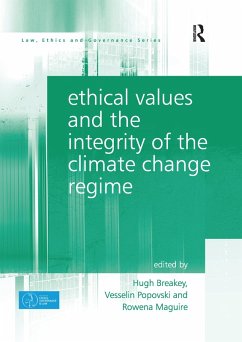This book investigates the ethical values that inform the global carbon integrity system, and reflects on alternative norms that could or should do so. The global carbon integrity system comprises the emerging international architecture being built to respond to the climate change. This architecture can be understood as an 'integrity system'- an inter-related set of institutions, governance arrangements, regulations and practices that work to ensure the system performs its role faithfully and effectively. This volume investigates the ways ethical values impact on where and how the integrity system works, where it fails, and how it can be improved. With a wide array of perspectives across many disciplines, including ethicists, philosophers, lawyers, governance experts and political theorists, the chapters seek to explore the positive values driving the global climate change processes, to offer an understanding of the motivations justifying the creation of the regime and the way that social norms impact upon the operation of the integrity system. The collection focuses on the nexus between ideal ethics and real-world implementation through institutions and laws. The book will be of interest to policy makers, climate change experts, carbon taxation regulators, academics, legal practitioners and researchers.
"While I believe that cooperative international action on climate change is unlikely to happen until after islands disappear or massive property loss occurs in the wake of a climate change-induced storm, a book like this is important for advancing public consciousness about climate change ethics and governance. This book talks cogently about decentralized and unsystematic collective problem solving and explores climate ethics and the moral problems raised by climate change. The book shows how human rights took decades to become universal, and climate ethics may be at the beginning of a similar trajectory." - Armin Rosencranz, Jindal Global University, India, and co-editor of Climate Change Science and Policy
"International debate and action addressing the impacts of climate change are bedevilled by a vacuum at the interface between the normative and empirical, between values and the practical. Ethical Values and the Integrity of the Climate Change Regime addresses this gap comprehensively. This timely collection of cross disciplinary expertise commendably combines ethical analysis with resources essential to public policy and public debate." - Noel Preston, Griffith University, Australia
"This excellent book goes a long way toward closing the gap between ethics and real-world climate change governance. Across a wide range of topics - including national governance, international trade, personal values, and international climate change negotiations - it provides insightful suggestions on how to employ ethical norms to effectively address climate change. This book will be useful to both scholars and policy makers." - John C. Dernbach, Widener University, Commonwealth Law School, USA
"This timely collection addresses how ethical values should work in shaping the global carbon integrity system. Written by an internationally renowned panel of experts, it is a must read for anyone interested in the ethical values underlying the policies and practices of the global climate change regime." - Fabrice Renaud, United Nations University, Germany
"International debate and action addressing the impacts of climate change are bedevilled by a vacuum at the interface between the normative and empirical, between values and the practical. Ethical Values and the Integrity of the Climate Change Regime addresses this gap comprehensively. This timely collection of cross disciplinary expertise commendably combines ethical analysis with resources essential to public policy and public debate." - Noel Preston, Griffith University, Australia
"This excellent book goes a long way toward closing the gap between ethics and real-world climate change governance. Across a wide range of topics - including national governance, international trade, personal values, and international climate change negotiations - it provides insightful suggestions on how to employ ethical norms to effectively address climate change. This book will be useful to both scholars and policy makers." - John C. Dernbach, Widener University, Commonwealth Law School, USA
"This timely collection addresses how ethical values should work in shaping the global carbon integrity system. Written by an internationally renowned panel of experts, it is a must read for anyone interested in the ethical values underlying the policies and practices of the global climate change regime." - Fabrice Renaud, United Nations University, Germany

